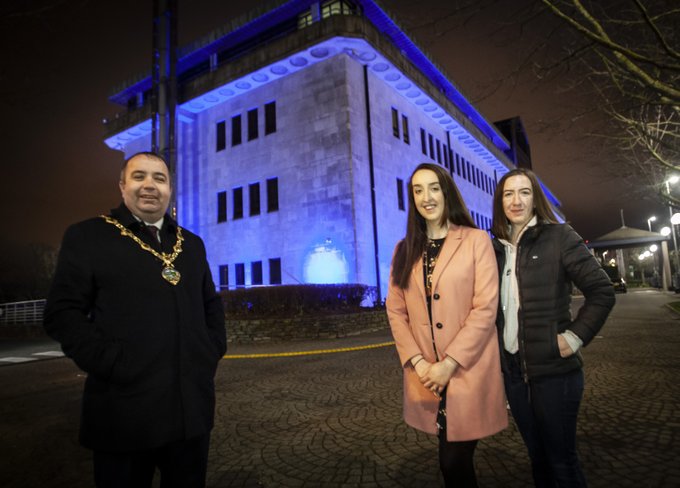
Mayor Brian Tierney was joined by cancer survivor Natalie Cairns who is campaigning to improve screening and support for the hundreds of women diagnosed each year
A total of 165 women in the North are diagnosed with the condition each year, more commonly women who have gone through the menopause,
But a number of cases are also being detected in younger women.
One of those cases is Derry woman Natalie Cairns, who had her first Ovarian Cancer diagnosis when she was only 28 when it was picked up during pregnancy.
Natalie is now campaigning for better services for other women here, after she struggled to find support locally when she received the devastating news that no woman wants to hear.
To mark Ovarian Cancer Awareness month, Natalie today joined Mayor of Derry and Strabane, Councillor Brian Tierney, in calling for a better localised support network, and for efforts to raise awareness to be stepped up for both the public and medical professionals.
“When I first received my diagnosis I did what most people would do and I began googling Ovarian Cancer. By the time I had finished I had myself dead and buried – the information was just so stark,” she recalls.
“There are lots of local cancer support groups, for Breast Cancer, Cervical Cancer, Lung Cancer etc.
“Sadly, there isn’t a dedicated Ovarian Cancer support group. I found that the other groups were able to discuss their medications, treatments and physical symptoms, but there was nowhere that I could share my experience with someone else who was going through the same thing.
“When I did speak to people about their family members their stories were usually about relatives and friends who had already passed away.”
Fortunately, Natalie’s gynaecologist put her in touch with an organisation in England – Ovacome who were able to give her some perspective about the condition and her own diagnosis.
“They were able to put things in better context for me” she explains.
“They listened to my story, my medical history and they were able to filter the information for me and provide the best advice and information suited to my condition. I think there is a real need for similar support here in the
North West, and a support group for those going through Ovarian Cancer and survivors.”
The cancer has become known as the silent killer as its symptoms can be similar to those of other medical conditions such as Irritable Bowel Syndrome.
Natalie’s cancer was detected by doctors while she was pregnant, but worryingly she had gone to her GP prior to this with symptoms.
“Looking back I had some of the signs and symptoms of Ovarian Cancer – bloating, digestion problems etc – but I didn’t put two and two together.
“There is a real need for better screening processes and better awareness both among medical professionals and the general public.
“There needs to be more information about the symptoms, and also that the condition can affect younger women as well as those in the over 70 age group where it’s more commonly found.
“There’s also a misconception that if you have a smear test it will show up Ovarian Cancer, and that’s not the case.”
Having had both ovaries removed after a second cancer diagnosis when she was 30, Natalie has thankfully been cancer free for over five years. But she is determined to try to help other local women by sharing her experience and continuing to raise awareness and campaign for better services.
This week Mayor Tierney gave his backing to her campaign calling on the health authorities to step up support for the 165 women in the North of Ireland who receive an Ovarian Cancer diagnosis each year.
“When I heard about Natalie’s campaign I wanted to show my support by helping to raise awareness of this condition that affects our grandmothers, mothers, sisters and friends, but also calling for our health service to improve its own capacity to deliver early diagnosis and support local patients.
“More resources should be channelled into educating our GPs, raising awareness among women of all ages to recognise the symptoms and improving screening so that earlier interventions are possible.
“I want to thank Natalie for campaigning on behalf of all local women, and I will continue to support her in her efforts.
“And I want to urge any woman who is experiencing any changes or symptoms which might be causing them concern – please don’t ignore them.
“Go to your GP. It could save your life,” he added.
Tags:




